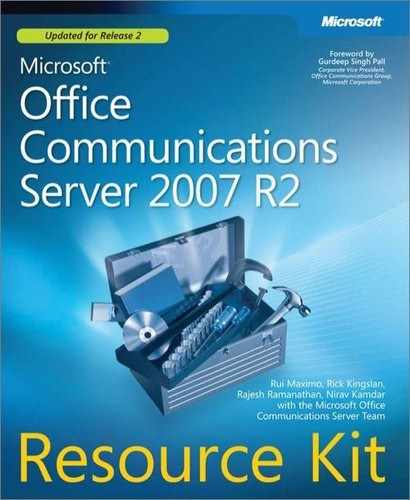Settings specific to a server are stored in the local WMI repository that is created when installing a server role. These settings are accessible from the Admin Tools MMC by right-clicking a server in the tree view pane and selecting Properties, as shown in Figure 18-17.
Generally speaking, for servers that belong to the pool, most settings are configured at the pool level. That way, an administrator can configure settings only once and they will be picked up by all servers in the pool. The only settings configured at the server scope are settings that differ from server to server. For example, setting up Internet Protocol (IP) addresses, ports, and certificates fall into this category.
For servers that don’t belong to a pool (for example, Edge Servers, Mediation Servers, and Communicator Web Access Servers), all classes are scoped at the server level. Note that some pool-level classes are also accessible on certain server roles. For example, the MSFT_SIPProxySetting class is available as both a pool-level class on the front-end server and as a machine-level class on Edge Servers. To access such classes on the Edge Server, WMI must be queried with a "NULL" specified for the BackEnd property. For example, when querying for the MSFT_ SIPProxySetting class on an Edge Server, the following query must be used:
select * from MSFT_SIPProxySetting where BackEnd="NULL"
The following sections present a selective subset of machine-level WMI classes. The complete list can be found at the Microsoft Developer Network (MSDN) website: http://msdn.microsoft.com.
The following WMI classes apply to all server roles. The first lists all the Office Communications Server roles installed on the machine, and the second is used to set the certificate that all Office Communications Server services installed on the machine will use.
MSFT_SIPServerInstalledComponentData:
MSFT_SIPRoutingSetting
The following WMI class applies only to Office Communications Server 2007 R2 Standard Edition and Enterprise Edition servers. It lists the IP and port information for individual servers in the pool.
MSFT_SIPListeningAddressData
The following WMI classes apply only to Standard Edition Servers and Enterprise Edition pool front-end servers. These classes are used to register inbuilt and third-party applications that the servers run.
MSFT_SIPApplicationSetting
MSFT_SIPApplicationPriorityList
The following WMI classes can be used to configure logging settings.
MSFT_SIPLogOptions. This WMI class exposes the Archiving settings on the Standard Edition Servers and Enterprise Edition pool front-end servers, as shown in Figure 18-18.
MSFT_SIPArchivingServiceSetting. This WMI class defines logging settings that are exposed on the Archiving Server.
The following WMI classes can be used to configure the CDR and Quality Metric Service (QMS) features on the Monitoring Server.
MSFT_SIPCDRServiceSetting
MSFT_SIPQoESetting
MSFT_SIPQMSExternalConsumer
MSFT_SIPQMSAlertingDefaults
MSFT_SIPQMSAlertingOverrides
MSFT_SIPQMSMonitoredMediationServer
MSFT_SIPQMSMonitoredAVMCU
MSFT_SIPQMSStaticSubnet
MSFT_SIPQMSStaticLocation
MSFT_SIPQMSDynamicSubnet
MSFT_SIPQMSSingleMaskSubnet
MSFT_SIPQMSDBConfigSetting
The following WMI classes apply only to Conferencing Servers.
MSFT_SIPAVMCUSetting
MSFT_SIPIMMCUSetting
MSFT_SIPACPMCUSetting
MSFT_SIPASMCUSetting
MSFT_SIPDataMCUSetting
The following WMI classes apply only to Communicator Web Access Servers.
MSFT_CWAServerSetting
MSFT_CWASupportedLanguage
MSFT_CWASiteSetting
The following WMI class applies only to Mediation Servers.
MSFT_SIPMediationServerConfigSetting
The following WMI classes apply only to Edge Servers.
MSFT_SIPEdgeServerListeningAddressSetting
MSFT_SIPMediaRelaySetting
MSFT_SIPMediaRelayNetworkInterfaceData
MSFT_SIPDataProxySetting
The following WMI classes apply only to the Access Edge Servers, with the exception of the class MSFT_SIPFederationInternalEdgeListeningAddressSetting. This class applies to all Edge Server roles.
MSFT_SIPFederationPartnerTable
MSFT_SIPFederationNetworkProviderTable
MSFT_SIPFederationInternalEdgeListeningAddressSetting
MSFT_SIPFederationInternalEdgeSetting
MSFT_SIPFederationInternalServerData
MSFT_SIPFederationInternalDomainData
MSFT_SIPFederationExternalEdgeSetting
MSFT_SIPFederationDeniedDomainSetting
MSFT_SIPEnhancedFederationConnectionLimitsData
MSFT_SIPEnhancedFederationDomainData


